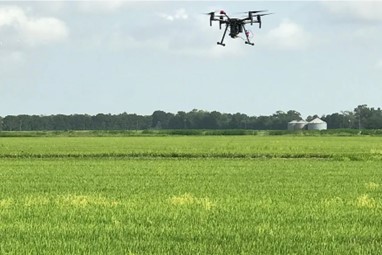Drones in Agriculture
Katelyn Miller, Field Crops and Forage Specialist
Southwest New York Dairy, Livestock and Field Crops Program

Drones first emerged during World War I with early radio-controlled aircraft. They became more widely used commercially in the 1990s, but agriculture has really embraced this technology in recent years. The suitability of drones on your farm depends on your specific needs, field conditions, and costs. Now, many farmers are wondering if drones might be the new frontier of agriculture.
Drones allow the application of pesticides to specific target areas. This could include areas with a specific pest problem, uneven terrain, or hard to reach fields. Under wet field conditions, drones can enter a field sooner than ground rigs and can avoid obstacles like telephone poles. These obstacles can make spraying complicated for a ground sprayer and may lead to pesticide drift and overspray.
On the flip side, high quality drones are expensive, requiring high investment costs. They are effective for targeted applications but can take longer to cover large areas in comparison to sprayers. Sprayers are established and widely understood whereas drones have many unknowns. Additionally, a Federal Aviation Administration (FAA) license is required to fly a drone. Certain areas have legal restrictions on drone usage and the drone itself must be registered every 3 years with the FAA. Additional exemptions are needed depending on the weight of the drone and the material it's carrying.
The decision on if you want to implement drones into your operation is up to you, but here are some things that you should consider:
- Like any piece of equipment, maintenance is important to its longevity. Is there someone that can perform general maintenance on the drone?
- The battery life of a drone can be short. You may need to buy extra batteries or more equippment to capitalize on ideal spraying conditions. This increases the initial cost investment.
- Storage capacity on the drone matters. There should be a place near fields to recharge batteries, refill tanks, mix and clean pesticide tanks. When fields are spread over many square miles, this can become a challenge.
- Flying a drone requires a liscense through the FAA which will have to be maintained every 24 months and an online recurrent training must be completed to maintain it.
- The verdict is still out on if drones achieve appropraite leaf coverage on plants. Not all drone nozzles can be switched out to achieve the most accurate spray width or droplet size. Research is still being conducted to evaluate how fungicides can infiltrate the canopy, how wide the spray reached, and how heavy the spray dispersion is.
- Hiring someone with a drone may be an option instead of diving into the enterprise yourself, but you must consider availability and cost. Is there a business applying pesticides with drones close to you? How do they ensure timely applications when they have to travel considerably to you? How do their costs compare to a traditional sprayer?
Drones are a fascinating technology being used in agriculture. If you're thinking about implementing this technology on your farm, make sure to conduct research, evaluate your specific farm needs, and determine if this is an economically sound investment.
Upcoming Events
Boots in the Barn: Cornell Dairy Research Updates
January 13, 2026
January 20, 2026
January 27, 2026
February 3, 2026
February 10, 2026
February 17, 2026
February 24, 2026
Join us for some or all!
New York Certified Organic (NYCO) Field Crops and Dairy Meeting
February 10, 2026
Geneva, NY
Piglet Health 101
February 13, 2026 : Piglet Health 101 - Batavia, NY
Batavia, NY
This free workshop from the New York Pork Producers offers hands-on training in essential piglet care and processing practices, led by industry veterinarians from Passion for Pigs. No matter your experience level, this training offers takeaways for both new and experienced producers.
Announcements
Cows, Crops & Critters Newsletter Sponsorship
TRYING TO REACH GROWERS AND AGRIBUSINESSES IN OUR SOUTHWEST REGION OF NEW YORK?Weekly Email Update: Shared with 625+ households who have signed up with our program.
Monthly Paper Mailer: To reach our stakeholders and farmers who lack internet access, we send out a monthly mailer where your company's logo and contact information would be featured with a mailing list of 330+ households.
If you sponsor our weekly and monthly publications you reach approximately 955 households.





